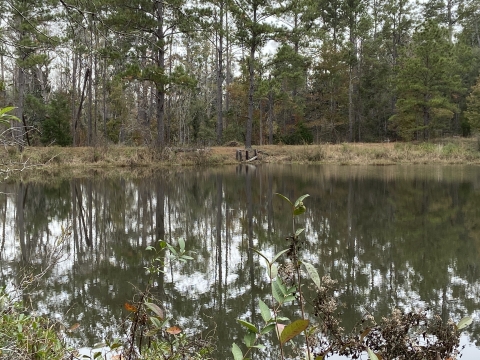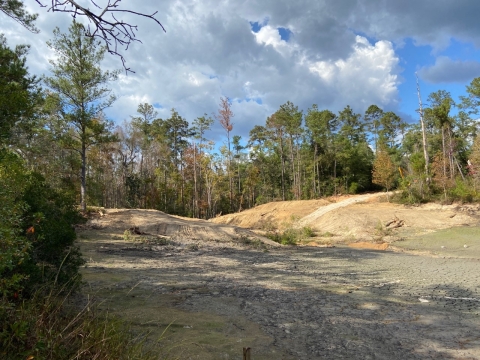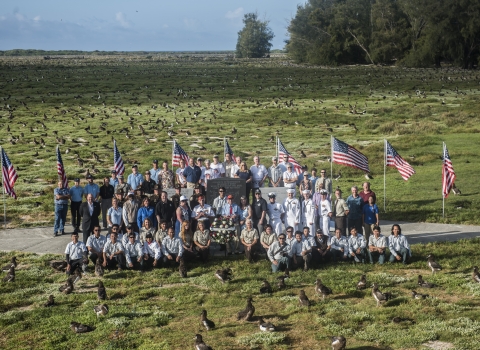Although football season in Tallahassee, Florida, often gives the sport’s fans a reason to cheer, this time of year, residents in neighboring Gadsden County and recreationists who visit the Apalachicola River have something else to celebrate.
In fact, a little-known observance in May gives cause for celebration all over the globe.
This year, World Fish Migration Day falls on May 25. While the international observance may prompt conservationists to reflect on the benefits of fish passage fish passage
Fish passage is the ability of fish or other aquatic species to move freely throughout their life to find food, reproduce, and complete their natural migration cycles. Millions of barriers to fish passage across the country are fragmenting habitat and leading to species declines. The U.S. Fish and Wildlife Service's National Fish Passage Program is working to reconnect watersheds to benefit both wildlife and people.
Learn more about fish passage , people in Gadsden County, Florida, truly do have a reason to celebrate.
Endangered freshwater mussels can now do their jobs of helping purify the water along Crooked Creek a bit better now that a longstanding dam has been removed.
Dams fragment water systems, prevent natural sediment movement downstream, and interrupt the natural flow and evolution pattern of rivers. Dams can create insurmountable hurdles or impenetrable blockages for fish. Fish passage barriers, like the dam removed in Gadsden County, prevent fish, mussels, and other aquatic wildlife from moving freely through waterways.
Restricted movement impacts water quality and keeps these animals from accessing food and reproducing. When fish are trapped on one side or the other, they can’t simply jump a dam to traverse the river system. Not being able to freely swim throughout the river system isn’t good for water purification because many fish often have freshwater mussels attached who are hitching rides throughout the waterways. Once the mussels get to another part of the river, thanks to their host fish, they set up shop and start working to filter and purify water. This natural water filtration system is vital for healthy waterways, aquatic species, and people.
The U.S. Fish and Wildlife Service teamed up with several partners, including private landowners, to remove a longstanding dam and restore habitat along the Crooked Creek area of the Apalachicola River.
“Private landowner partnerships are essential to recover listed and at-risk species as well as promoting healthy environments for future generations,” said Chris Metcalf, a U.S. Fish and Wildlife Service biologist who supervised the dam removal in Gadsden County.
Thanks to the willing landowner and other conservation partners who worked with Metcalf, a number of fish, including Gulf sturgeon and freshwater mussels who hitch rides on fish transiting Crooked Creek can now move freely. Removing the dam in Florida opened up more than two miles along Crooked Creek for endangered mussels, their host fish who transit this area, and other aquatic species. The project, which included bank restoration with sod, plants, and shrubs, spanned across 10 acres of land.
Funding from the Bipartisan Infrastructure Law made the project possible.
The law is the largest investment in the resilience of physical and natural systems in American history. By removing in-stream barriers, like the dam in Gadsden County, BIL helps restore rivers, protect wildlife, support communities, and improve climate resilience. The $150,000 BIL investment in Gadsden County not only benefits the mussels, fish and plants living in that waterway but people in the community too.
Approximately 1.5 million gallons of water now flows naturally along this section of the river annually. That’s drinking water for some and clean recreational areas for others, like boaters, paddlers, and kayakers. Anglers also reap the benefits of healthy fish and fishing holes along this part of the river.
“Promoting clean water and habitat for aquatic species benefits not only localized environments near Crooked Creek dam, but as a whole, provides long-term health for the Apalachicola River basin,” Metcalf said.
In addition to BIL funding, the National Fish Passage Program helps mitigate the impacts of dams, culverts, and other water-based barriers. The Service constantly explores ways to collaborate with conservation organizations and private landowners willing to partner on projects that preserve and protect wildlife and make communities safer.






